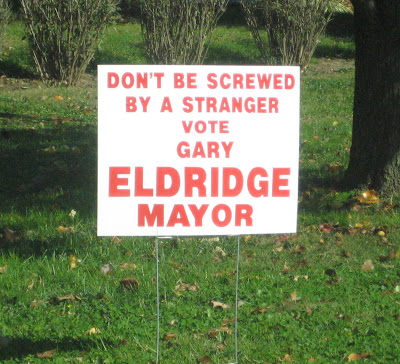On December 21, 2009, Heartland Publications, the parent company of the Portsmouth Daily Times, filed for Chapter 11 Bankruptcy. As of October 2009, Heartland had debts of $166.2 million but assets of only $134.3 million, which is a deficit of some $32 million. Heartland announced that it hoped to restructure itself, emerge from bankruptcy, and eventually return to profitability. Given the precarious financial condition of newspapers generally in the United States, and of Heartland Publications in particular, the prospects of Heartland ever returning to profitability seems like a pipe dream and its announcement just a hollow public relations pronouncement. When, pray tell, was Heartland, founded by James M. McGinnis, Jr., in 2004, ever profitable?
The federal government used stimulus packages to bail out Citigroup and other financial institutions as well as General Motors, which are showing signs of recovery. But the government is not about to bail out the newspaper industry. No one can seriously make the case that newspapers are too important to the economy to be allowed to fail. On the contrary, print newspapers are an increasingly obsolete if not irrelevant industry. As many residents in Portsmouth have learned, the incredibly shrinking Portsmouth Daily Times is something they can easily live without. For those of us who feel that it is editorially bankrupt and believe that it is the house organ of the Southern Ohio Growth Partnership, the financial bankruptcy of its parent company comes as no surprise. Like the system of canals that were built in Ohio and elsewhere in the United States in the early nineteenth century, canals that were subsequently rendered obsolete by railroads, the newspaper industry is being rendered obsolete by the Internet. Perpetuating newspapers makes about as much sense, financially, as perpetuating canals.
In addition to suffering from the same economic problems that other newspaper companies are plagued with, Heartland Publications has problems peculiar to itself. McGinnis, the founder and CEO of Heartland, turned out to be not only incompetent but a crook. He made his home and headquartered his business, incidentally, not in the heartland of America, but in Florida, and he drove a car produced not in the American heartland, but in England, a gold Jaguar. In a plea bargain, McGinnis later admitted having stolen $1.7 million from his own company after which he forged bank account statements to cover his theft. (I wrote about McGinnis in River Vices back in 2005 in “Prostitute Times.”) McGinnis reportedly had named his company Heartland because his weekly and small daily newspapers were located in what used to be called America’s heartland but what is now more often referred to as America’s Rust Belt. It is too often the case that con artists use patriotic names and sacred symbols in which to wrap their greedy and ill-conceived schemes, as McGinnis did Heartland, which now, not surprisingly, has gone belly up.
The Portsmouth Daily Times’s parent Heartland Publications filing for bankruptcy came fast on the heels of an announcement by the newspaper that it had appointed Deborah Daniels, previously a features reporter, as managing editor. Whether she is “acting” (i.e., temporary) or permanent managing editor is not clear, but at this point what’s the difference? Isn’t everyone at the PDT now effectively temporary? Daniels may have been the reporter who some years back wrote a series of investigative articles on prostitution in Portsmouth. It is the only investigative reporting that I can recall the PDT doing in the last twenty years. If I recall, she or whoever wrote the series concluded prostitution was a result of drugs, to which most of the prostitutes were addicted, but she apparently did not investigate the notorious local lawyer who was and still is widely rumored to be involved in both the drug and prostitution rackets in Portsmouth. PDT reporters would not do that kind of investigation because certain local lawyers like certain local businessmen enjoy an immunity from investigation and prosecution
I will be taking a sabbatical from River Vices for the first half of 2010 to prepare a publication for the 300th anniversary of a church in my hometown, in Massachusetts, which I mentioned in a previous posting. I know that the results of the recent municipal elections in Portsmouth, while encouraging, do not signal the end of the problems plaguing our community, including drugs and prostitution, but rather just the first tentative steps toward addressing them. I wish I could continue to investigate and comment on those problems in the months ahead. But I know from the past four and a half years of writing River Vices that it takes up more time than most people might imagine. It is not the writing—it is the research and the editing (the editing above all) that demands so much time. I envy those who can knock off a piece of writing with no sweat in no time. I agonize over each word and sentence and I revise constantly, and still end up dissatisfied with the results.
I even envy those emotionally and mentally disturbed individuals who post frequently and anonymously in chatrooms and blogs, without regard for spelling, syntax, or sense. For several years, in the 1950s, as an undergraduate, I worked as a psychiatric aide in a mental hospital, on the graveyard shift, usually on the ward for the criminally insane. Every day, I see people walking the streets of Portsmouth or posting on the Internet who probably would have been institutionalized in the 1950s, when there was very little tolerance for non-conformity. But today with the development of antipsychotic drugs and tranquilizers, people who would previously be walking in circles in a mental ward can today not only walk the streets but also can exercise their First Amendment rights on the Internet, even if they are somewhat mentally disturbed or have personality disorders. Why do they post anonymously? Why don’t they sign their names and identify themselves? They’re mentally disturbed, some of them clinically so, but they are not so crazy as to use their real names and identify themselves. And for good reason. Their anonymity encourages them to write things that they would not be so brave or foolish enough to write if their identity were known.
Since what they say and how they say it indicates they are disturbed, they don’t want to reveal who they are. And why should they? They have a right not to. We live in a free and increasingly insane country, and they have a right to remain anonymous and disturbed, and a right to not be exposed as part of the madding crowd. It is only when they act out their Internet gun-nut assassination fantasies that they become dangerous; it is only when they show that they are crazier than they are cowardly that they need to be feared. That is why gun nuttiness on the Internet should not be ignored.
The crazies are one thing, skunks another. The skunks don’t reveal their identity because . . . Well, because they’re skunks and like the scorpion in the fable of the frog and the scorpion, can’t help doing what comes naturally. Which is make money. Skunks are foxy and know how to make a buck while faking being philanthropists. But we need them all, and we will especially need them when the Portsmouth Daily Times is no more. Let a hundred bloggers blog; let a hundred schools of thought contend. This a rule that should be followed in America and especially in the so-called American heartland. Let the presses of the bankrupt PDT rust in peace but let the bloggers blog. Long live the blogosphere!
.
















